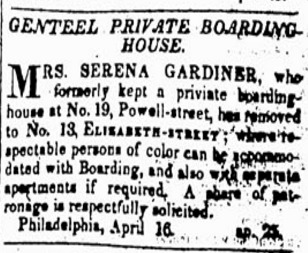- About
-
Student Exhibits
- Rebellions Abroad! — by Travis Heeren
- A Glossary of Black Women in Rebellion — by Kaylor MacLaughlin
- Rumored — by Serena Morgan
- Fragmented Individual Acts of Rebellion — by Twila Neiwert
- John Brown, Harpers Ferry, and the Media — by Bessie Rudd
- Louisiana: Rumors and Insurrections — by Stephanie Smith
- Revolutionaries & Art in Black Cuban Uprisings — by Jiesha Stephens
- Mapping Rumored Rebellions in the South — by Jalen Thompson
- Black Asylum and Sovereignty — by Adam Vernon
- Days in a Demi-Decade: Miscellaneous Rebellions in 19th Century African American Newspapers (1856-1860) — by Hannah Zeller
- Summarily Punished
Boarding House
Boarding houses, often operated by black women, were a place where black activists could be fed, dressed, and gather in community. In an exhibit called “Black Women’s Economic Power: Visualizing Domestic Spaces in the 1830s” the Colored Conventions Project describes the ways these houses served as “sites of Black intellectual production” and locations where “hostesses provided comfortable spaces for delegates of 1830s conventions and helped to transform their communities into hubs for activism.” These boarding houses also operated as locations for formerly enslaved people to get back on their feet via work, childcare, food, and necessities. One archival example of this is the case of Susan Wilson,a formerly enslaved black woman who relied upon the services of the “ladies” of a boarding house for food, childcare, and work in order to save enough money to attempt to buy her husband’s freedom (The Generous Planter).
Visit the Colored Conventions Project site here.
